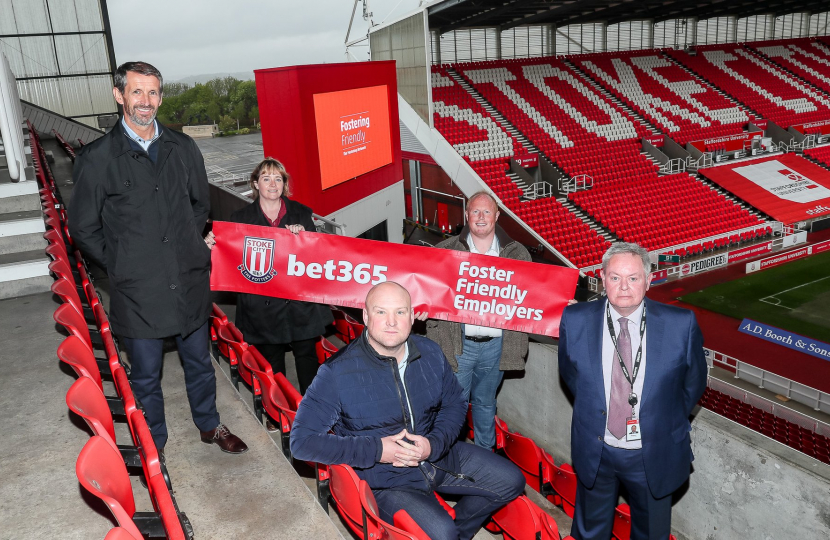Four years ago, it was obvious that improving outcomes for children and young people would need to be the city council’s number one priority. The Ofsted inspection of 2019 painted a bleak picture of children’s social care in Stoke-on-Trent, reflecting what felt like at the time a different organisation to the one I had just become leader of.
When you stand on doorsteps at election time, no-one ever says: “I’ll vote for you if you improve children’s social care.” However, it was obvious to me that this ambition had to transcend populism if we were to change the futures of our children and young people.
Councillors set strategy, whilst officers advise and implement. Nowhere is this principle harder to set in motion than in children’s social care. Who disagrees with the notion that all children should be loved, cherished and supported to achieve their full potential? And of course, unless you are a qualified social worker (which most councillors aren’t) it can be difficult to get to grips with what exactly your role is as an elected member in this area.
So began my tenure as leader, trying to understand the acronyms and services. Almost every week involved at least one meeting about children’s social care, and whilst my understanding grew, this was in proportion to my frustration at not being able to help, which is my natural instinct. What could I do was the question I regularly wrestled with.
Even in the darkest, most despairing places, there is hope. Hope came for me in the form of an idea to direct my enthusiasm at increasing the number of foster carers in the city. If a children is unable to live with its family, then the next best step is to live with either a relative (a connected carer) or in a loving home with foster carers. In Stoke-on-Trent, we have a shortage of city council foster carers, meaning we often have to resort to using expensive private agency foster carers. This in turn impacts the money available for other things the council provides.
I was initially told increasing the number of foster carers would be ‘too difficult’, but never one to be deterred, I ploughed on. As one of the city’s biggest employers, starting with recruiting from our own City Council staff was obvious, making changes to how foster carers would be supported, using the Fostering Network’s advice. This scheme - Fostering Friendly - really struck a chord with me, and I realised that if we could scale it up, not only would we increase the pool of potential foster carers, but we would also suddenly make the city’s children’s social care challenges more relevant, being talked about in workplaces across Stoke-on-Trent.
Getting out my black book, I picked out the biggest employers in the city and set about recruiting them, through their chief executives and directors, one by one, to become Fostering Friendly. Our first big success was Stoke City FC, who through the advocacy of Tony Scholes brought not only the club but also Bet365 forward. Tony’s support was pivotal in not just securing the involvement of the city’s biggest employer, and the first Football League club to be confirmed as Fostering Friendly, but buy in to the idea that this could be more than just a slogan.
As a result, Stoke City FC provide a range of opportunities for care experienced children and their foster families, as well as promoting Fostering Friendly regularly to fans. I am indebted to Tony for his belief in the scheme from the very start, but also to Adrian Hurst from the club’s Community Trust for making those practical examples happen, that really set the tone for the wider role out across the city.
Today, 17 of Stoke-on-Trent’s major employers are officially Fostering Friendly, including both of our football clubs, the local hospital and other health care providers, Staffordshire University, Staffordshire Police, Staffordshire Fire and Rescue Service, and Staffordshire Chambers who promote onwards to their hundreds of members. This is the largest concentration of Fostering Friendly employers in the country, making Stoke-on-Trent the UK’s first Fostering Friendly City, and reflects a massive commitment to improving the future of our city’s children and young people, promoting how fostering can change lives and raising the profile of an issue that is pivotal for the future of our city.
Today, services for children in care and care leavers in Stoke-on-Trent are rated good, the best they have ever been, and Stoke-on-Trent City Council won the Fostering Network’s Employer of the Year in 2022 for the Fostering Friendly City initiative.
But there is still more to do. One of the last decisions I oversaw as leader of the city council was to increase allowances for foster carers. However, with more than 1,000 children in the care of the city council, there are still too many Stoke-on-Trent children and young people put in foster placements outside the city, rather than in loving homes here.
This #FosterCareFortnight is a great opportunity to encourage even more Stoke-on-Trent residents and businesses to consider what part they can play in supporting what has to be our top priority. You can find more details here about the Fostering Network’s Fostering Friendly scheme - https://www.thefosteringnetwork.org.uk/blogs/phil-jacob/fostering-frien…
The Fostering Friendly employers in Stoke-on-Trent are Aspire Housing, bet365, Stoke-on-Trent City Council, the Davies Group, Midlands Partnership NHS Foundation Trust, North Staffordshire Combined Healthcare, Port Vale Football Club, Staffordshire & Stoke-on-Trent Integrated Care Board, Staffordshire Chamber of Commerce, Staffordshire Fire & Rescue Service, Staffordshire Police, Staffordshire University, Stoke City Football Club and Community Trust, the Stone Group, Synectics Solutions, Unitas, and the University Hospital of the North Midlands.
Copyright 2025 Cllr Abi Brown . All rights reserved.
Powered by Bluetree


